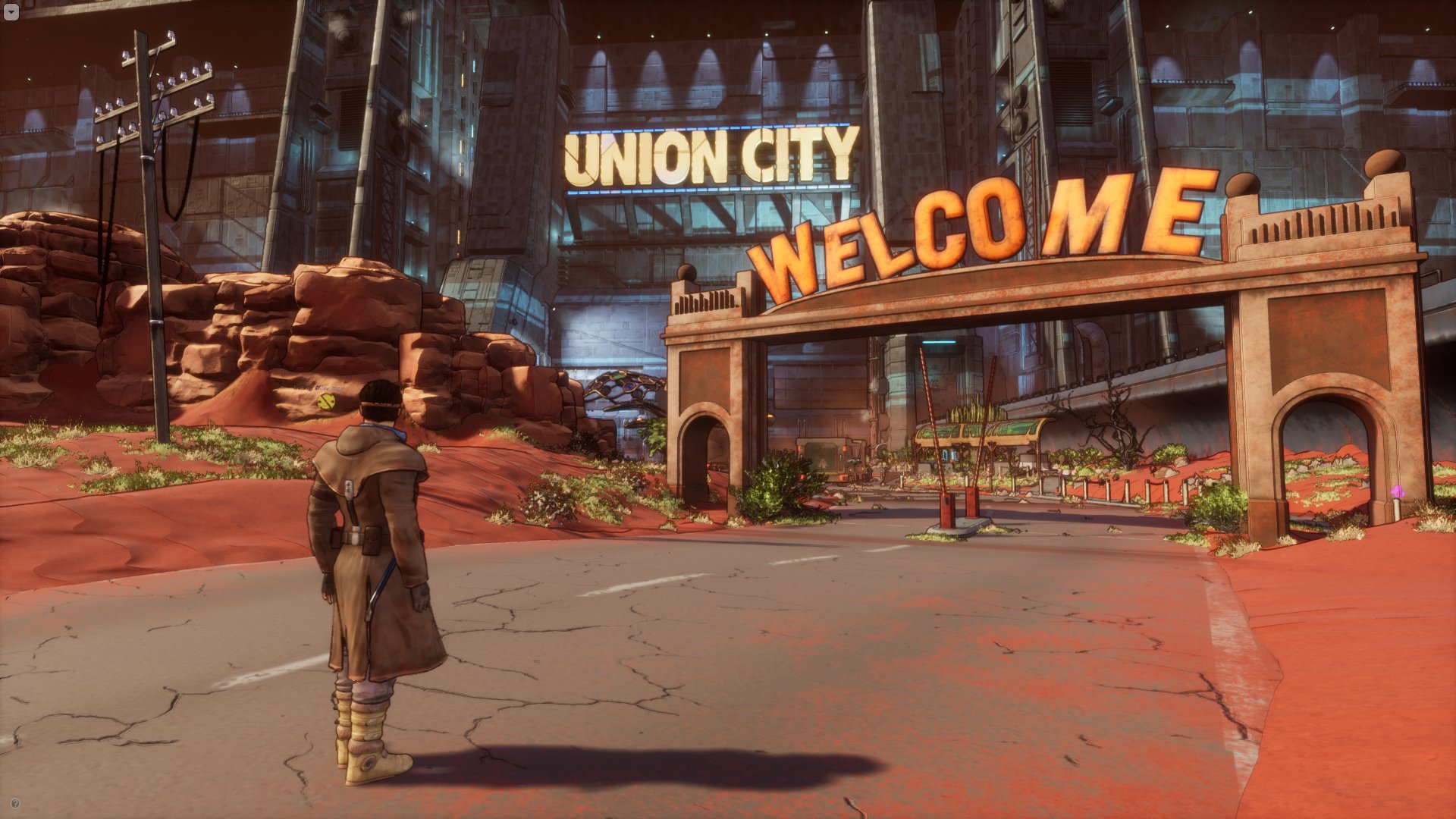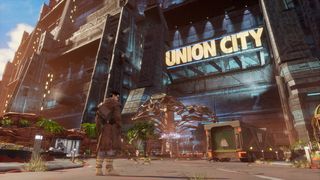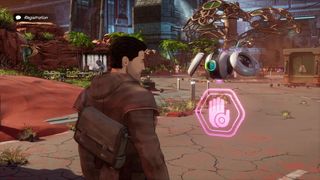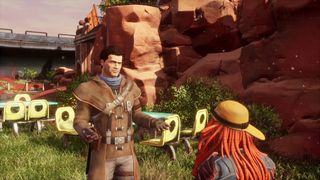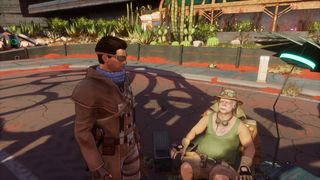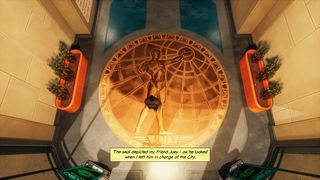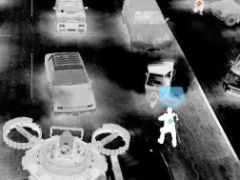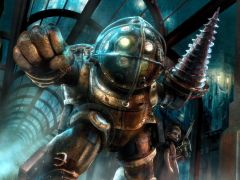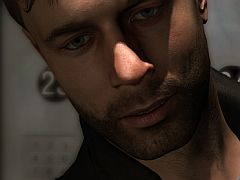You can trust VideoGamer. Our team of gaming experts spend hours testing and reviewing the latest games, to ensure you're reading the most comprehensive guide possible. Rest assured, all imagery and advice is unique and original. Check out how we test and review games here
Beyond a Steel Sky is the sequel to Beneath a Steel Sky, an adventure game from the mid-1990s. It's rendered in the sort of three-dimensional world not possible then, but it's filled with the point-and-click style logic puzzles and dialogue-driven mysteries that defined the design of adventure games in that time. It's not the sort of game I would gravitate towards typically. But, these are not typical times, and this follow-up to a game I have never played has the funny feeling of familiarity about it.
Let me set the scene. I played a lot of historical city builders, business sims, and puzzle games, when I was growing up. I became attuned to the chirps and chimes of a correct answer and the oranges and scarlets of a failing residential district. There's a comforting simplicity to the systems of these games, and the satisfaction of seeing the pieces slot into place, when the solution has foxed you for days, can't be beaten. But now my virtual exploits tend to be a little less erudite and a little more shooty-bang. (Like when you didn't like spice as a child, and then, as an adult, you dare yourself to chow down on a green jalapeno in a crowded restaurant. Fun? Yes. Clever? Not especially.) At first glance, though I appreciated Beyond a Steel Sky's cel-shaded, comic-book art style, I wondered if it was going to satisfy, or if it would feel stuck in the past.
Revolution Software, the team that developed Beneath a Steel Sky, in 1994, have returned for the sequel. It may be argued that no one else could have taken the reins on such a project, as the original was borne of a collaboration between studio CEO Charles Cecil and Watchmen comics artist Dave Gibbons. The two endeavoured to discover if there was a middle point between serious subject matter and irreverent wisecracks, and Beneath a Steel Sky succeeded in this task. The game became a cult classic, and it's surprising that sixteen years have passed before we've gotten another Preposition a Steel Sky. Of what I've played, Beyond a Steel Sky copies its big brother, but it doesn't stand in its shadow.
The cutscenes play out in still frames, like the pages of a comic book. Protagonist Robert Foster, his friend, and his friend’s son are attacked by the drivers of a mysterious four-legged vehicle while on a fishing trip. The child is stolen by these masked figures, when he and his friend are incapacitated, and Foster attempts to find the boy, who has disappeared with his captors into the endless sands of the "Gap" (imagine an apocalyptic Australian outback). The trail takes him to the hulking walls of Union City, one of the only megacities that has survived the cruel conditions of the apocalypse.
All of this will sound somewhat familiar to those who played Beneath A Steel Sky, or to those who've given the game's Wikipedia entry a once-over. Foster's quest will expose him to the darkest aspects of humanity—who steals a child?—but that won't stop him from cracking terrible jokes and dancing like nobody's watching. When he dryly remarked that a welcome mat wouldn't go amiss in the confines of Union City, I knew that Beyond a Steel Sky had no intention of winning me over with glitzy graphics and a gritty story but to the beat of those adventure games that took centre stage on a shelf in the Blockbuster up the road, all those years ago.
And that's what makes it so very enjoyable. Foster's gurns and befuddled dialogue elevate his characterisation above a vehicle for the player to explore nooks and crannies for plot-pertinent items. When I experimented with what tool could be used on which object to fruitless results, he shrugged it off with style. Though the product of a traumatic childhood and a bare bones existence in the Gap, Foster greets people with cheery enthusiasm every time. He's funny, and why not? Classic puzzle and adventure games often used a protagonist who rubbed elbows with the player, with their musings and observations acting as a conversation. It is refreshing, especially when lots of modern games do away with this relationship, to condense information into the UI in the most efficient manner.
References to the previous game are peppered here and there, but thanks to a quick recap at the start of this game, they don't feel out of place to a new player. And I imagine that plenty of people will be reminded of Telltale Games titles, when looking at the characters and world of Union City. There is an unabashed colourfulness to this apocalypse, in the painterly strokes of cloud in the lilac sky and the starkness of the cyberpunk infrastructure. Had Revolution Software stuck to its guns and reproduced the subdued shades of Beneath a Steel Sky, it may have been eclipsed by more recent dystopian sci-fi games out there. In addition, the fusion of comic-book narration bubbles with the interface of a video game is masterfully done, with no hokeyness or self-consciousness. However, there were instances where a character would stand confidently on top of a bollard, or glide along the ground, or forget to open and close their mouth while chatting. I'm sure the studio is aware of these bugs, and that they'll be ironed out by the time of its release.
As such, there's a funny familiarity in this unfamiliar game. The methodical nature of logic puzzles, is a gentle change of pace. The chimes of a correct solution echo backwards and now forwards in time, and the dynamic artistic direction of Beyond a Steel Sky offers a deeper engagement with its legacy elements borne of mid-1990s computer games. When everything around us is chaotic and uncertain, it is one approach to reflect that in our choice of entertainment, booting up a shooty-bang game to barrel through, no holds barred. But it is also possible to turn to something which emulates a time that feels simpler by the day, and which makes quieter requests of you. And that's what I didn’t know I needed right now.
Beyond a Steel Sky
- Platform(s): iOS, Linux, Nintendo Switch, PC, PlayStation 4, PlayStation 5, Xbox One, Xbox Series S/X
- Genre(s): Action, Adventure, Indie
